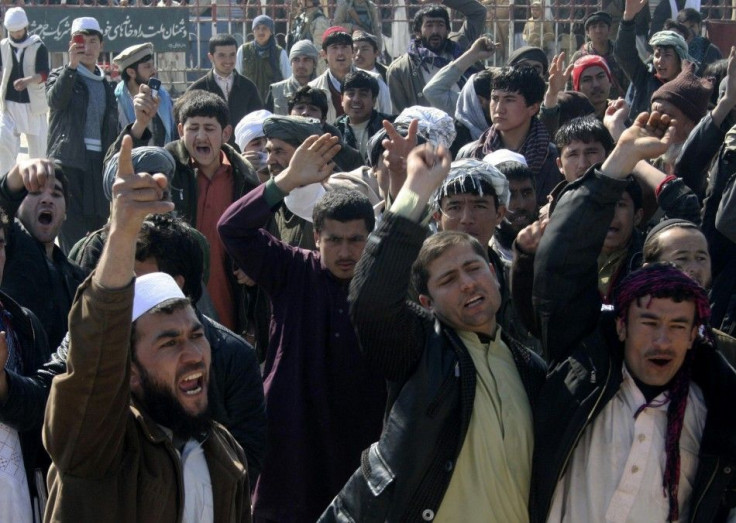7 Americans Wounded amid Afghan Rage over Koran Burning

(Reuters) - Seven U.S. military trainers were wounded Sunday when a grenade was thrown at their base in northern Afghanistan, police said, underscoring the depth of anti-Western fury over the burning of copies of the Koran at a NATO base.
Despite an apology from President Barack Obama, riots raged across the country for a sixth day against the desecration of the Muslim holy book last week at the biggest NATO base in Afghanistan. Some protesters hoisted the white Taliban flag.
On Monday morning, three people were killed and five wounded when a powerful car bomb exploded at the gates of Jalalabad airport in eastern Afghanistan, police told Reuters.
The casualties appeared to be civilians, said Obaidullah Talwar, a senior police detective for eastern Nangarhar province, of which Jalalabad is capital.
There was no immediate indication whether the blast was linked to deadly protests and riots that have racked Afghanistan since copies of the Koran were inadvertently burned at a major NATO base last week.
With few signs of the crisis abating, the U.S. ambassador to Afghanistan said the United States should resist the urge to pull troops out of Afghanistan ahead of schedule.
Tensions are running very high here. I think we need to let things calm down, return to a more normal atmosphere, and then get on with business, Ambassador Ryan Crocker told CNN's State of the Union in an interview from Kabul.
This is not the time to decide that we are done here. We have got to redouble our efforts. We've got to create a situation that al Qaeda is not coming back, he said.
Under an international agreement, foreign combat forces are due to leave Afghanistan by the end of 2014.
The groundswell of anger over the burning of the Koran, which Muslims revere as the literal word of God, has highlighted the challenges ahead as Western forces try to quell violence and bring about some form of reconciliation with the Taliban.
That anger has been demonstrated by attacks against NATO forces in recent days.
One civilian was killed and 18 wounded, including three policemen, in riots near the NATO base in northern Kunduz province, where the blast that wounded the Americans took place, regional police chief Samihullah Qatra told reporters.
NATO confirmed there had been an explosion outside one of its bases in northern Afghanistan, but declined to comment on casualties.
The protests have killed 30 people and wounded 200, including two U.S. troops who were shot dead by an Afghan soldier who joined rallies in the country's east.
In an interview from Rabat, U.S. Secretary of State Hillary Clinton said the violence is out of hand and it needs to stop.
FATAL SHOOTING
Also on Sunday, the Afghan Interior Ministry identified one of its employees as a suspect in the fatal shooting of two U.S. officers in its headquarters a day earlier, an attack that prompted NATO to recall its staff from ministries.
The Taliban took responsibility for the attack, saying it was in retaliation for the burning of the Korans. The Islamist group often exaggerates claims involving attacks against Western forces in Afghanistan.
Afghan security sources identified Abdul Saboor, a 25-year-old police intelligence officer, as a suspect in the shooting of the Americans at close range inside the interior ministry.
In a statement to media, the ministry said: An employee has been identified as a suspect and he has now fled. The Interior Ministry is trying to arrest the suspected individual.
The attack inside the heavily-guarded interior ministry illustrates the dilemma faced by NATO forces as they move away from a combat role to an advise-and-assist mission, which will require them to place more staff in Kabul's ministries.
CCTV footage showed that Saboor had access to the Command and Control Centre, tucked deep inside the ministry, where the slain Americans were found, security officials told Reuters on condition of anonymity.
Afghan President Hamid Karzai repeated his plea for calm and restraint. It is time to regain and preserve our calm, and not allow our enemies to misuse it, he told reporters, referring to the nationwide violence.
In Washington, a U.S. Defense Department spokesman said the Afghan defence and interior ministers were postponing scheduled trips to the United States this week to consult with other Afghan leaders about how to protect allied forces and quell the violence.
The United States is by far the largest contributor to the NATO-led force in Afghanistan, which is gradually ceding security responsibility to Afghans.
Under an agreement reached at an international conference in Lisbon in December 2010, the NATO force is to wind down its combat operations by the end of 2014, although there are signs that process may be hastened.
Earlier this month, U.S. Defense Secretary Leon Panetta suggested the United States could end its combat role as early as next year, remarks that surprised allies in Europe and Kabul.
With the 2014 timetable unfolding, pressure is growing for an earlier pullout, especially among Washington's allies in Europe, where the bloody and expensive war is deeply unpopular.
Similar incidents of desecration of the Koran in the past have also sparked violence, although not as widespread and persistent as the riots and protests over the past week.
Last April, seven foreign U.N. staff were killed when protesters over-ran a base in the northern city of Mazar-i-Sharif after a pastor from a fringe church in the United States deliberately burnt a copy of the Koran.
(Additional reporting by Jackie Frank in Washington; and Amie Ferris-Rotman in Kabul; Writing by Paul Tait; Editing by Ed Lane)
© Copyright Thomson Reuters {{Year}}. All rights reserved.





















